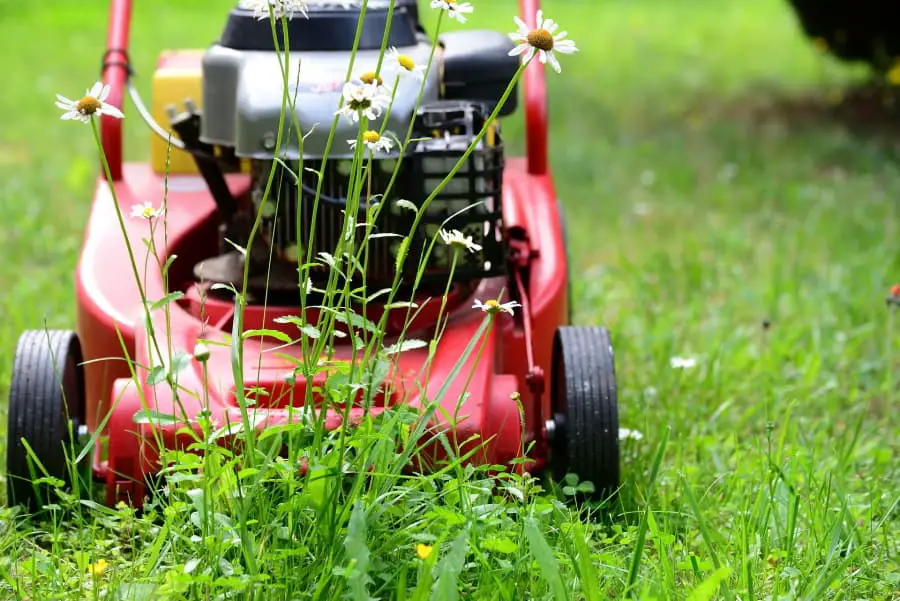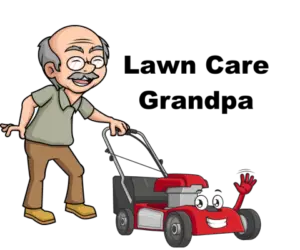Power lawnmowers are awesome machines that offer a convenient way to maintain your lawn. In addition, they come in all shapes and sizes to cater to various personal and professional lawn care needs. However, over time, many lawnmowers may experience performance problems.
A mower that bogs down or is not running at full power can be addressed by correcting issues such as fuel octane, debris, deteriorated drive belts, batteries, aged fuel, spark plugs, or oil levels. Regular maintenance is key to keeping a lawn mower running at full capacity.
One of the major problems you are likely to experience is reduced power output, which is my focus today. Join me as we discuss this problem, its causes, and, more importantly, its solutions. Hopefully, by the end of this article, you have a better understanding of how your lawnmower works, and how to deal with this particular issue.

Contents
Why Is Your Lawn Mower Weak?
Lawn mower motors, like all combustion engines, have specific power output levels for optimum performance. Depending on the type of mower, the engine will be responsible for the machine’s movement, as well as, the rotation of the blades.
Lawn mowers may seem weak if the wrong horsepower in an engine is paired with the wrong job. It can also occur if deferred maintenance has occurred or parts have been allowed to become damaged or deteriorated over time. The underlying issue must be addressed before weak performance can be remedied.
To aid in this, I have listed many of the problems below that can contribute to the problem of low power. Mowers like many machines have several moving parts and power sources that all need to be running adequately in union.
What Lawn Mower Horsepower Is Good?
First, let’s take a look at what “full power” entails for a lawnmower. In this chart I have listed the average range of measured in horsepower for the most common types of mowers.
| Type Of Lawn Mower | Horsepower Range |
| Reel Mowers | 0 |
| Push Mowers | 2-5 |
| Self Propelled Mowers | 5-10 |
| Riding Mowers | 12-25 |
| Commercial Mowers | 25-35 |
Simple push mowers, which are primarily used for small yards, tend to have a power output range of about 2-5 horsepower. Self-propelled lawnmowers, which can be used for tending small, medium, and large yards, are typically more powerful at 5-10 horses.
Riding mowers (lawn tractors and zero-turns) are more powerful, with an average range of 12-25 horsepower. Commercial riding mowers can sometimes be above the 30-horsepower mark.
A Lawn Mower Bogging or Loses Power
Now, regardless of their size, type, and function, all lawnmowers are susceptible to eventual wear and tear. Any number of things can go wrong, and reduced power output is but one of these issues. But what causes it?
Any number of things can cause your lawnmower to drop its output levels.
Oil Levels Can Cause A Mower To Lose Power
One of the most common causes is the oil level, which can either be too low or too high. Oil is responsible for lubricating multiple engine parts and, so, a lack of it is bad news for your mower.
Too little oil will result in a lot of metal parts grinding roughly against each other, which will wear them down, and cause the mower to run at a lower power level.
Too much oil could result in frothing, which reduces the lubricative qualities of the oil. The effects of this are the same as with too little oil.
Another source of problems is dirt and debris.
Debris And Mower Power Loss
Firstly, dirt can affect the carburetor. The carburetor is responsible for delivering fuel to the combustion chamber in the engine cylinder. Dirt can build-up to the point where it can reduce the volume of fuel the carburetor delivers per combustion cycle. This will cause the motor to run inconsistently, and suffer from low power output.
Dirt can affect the rest of the fuel system too. The fuel filter or even the fuel lines can get clogged up with dirt, debris, and sedimentation from low-octane fuels. The fuel system feeds into the carburetor, and the same problems listed above will arise.
Debris can also affect airflow. Air is required for cooling the engine and for providing oxygen to the combustion chamber. Mud and even grass clippings can block air inlets and the air filter, depriving the engine of both these needs.
An overheated engine will peter out very quickly, while a lack of oxygen will result in poor combustion. The mower will also lose power noticeably.
Worn Spark Plugs Cause A Weak Mower Performance
Another part to check if you are experiencing power problems is the sparkplug. The plug may be worn out, dislodged from its proper position, or obstructed by dirt over time. This will affect its ability to add the necessary spark to the combustion chamber as and when needed. As we’ve seen above, weak combustion leads to low power output.
Excessively Tall Grass Will Bog Down A Mower
Sometimes the mower will lose power due to how it is being used, rather than some mechanical fault. Cutting excessively tall or dense grass may put too much strain on your lawnmower blades and, ultimately, the mower engine itself will lose power.
Also, the clumped-up debris and grass clippings on the underside of the mower deck can bunch up and affect the rotation of the blade.
Power loss can also be caused by the following:
- Damaged drive belt
Everything on a power mower relies on the rotation of the blades. For self propelled and riding mowers, the motion of the mower itself is dependent on the engine for operation. The main way that this energy flows from the engine to these parts is by the use of belts. Damaged or deteriorated drive belts can definitely cause power loss.
- Old batteries (electric mowers)
One of the most convenient options on an electric mower is the free maneuverability of batteries over corded models. Yet, these batteries are much more temperamental than cords hooked to a wall outlet. Batteries are susceptible to extreme temperatures and short lifespans. An old or damaged battery can cause power loss in electric mowers.
- Low-octane fuel
For older gas powered mowers especially, the octane that you choose for the engine can sometimes determine the power output of the mower. It is not advisable to use the highest level of octane in a mower, but older models can sometimes benefit from mid-grade fuel.
- Aged fuel
Without fuel stabilizers, gas that has been left to sit for an extended period of time will experience natural chemical reactions that break down the gas creating more and more water. This dilutes the fuel in several ways and can lead to low performance in mowers and other lawn equipment.
To read more articles on mowers and their operation, I suggest some of my other articles…
- Increase Lawn Mower Horsepower? Here’s How To Do It.
- Convert Lawn Mower To Mulcher: Here’s How To Do It
- Are All Lawn Mower Spark Plugs The Same?
How To Solve A Sluggish Mower Problem
Luckily, most of the causes discussed above can be avoided with routine maintenance. Everything else can be addressed with quick repairs or replacement parts.
To solve a sluggish mower issue the underling cause or causes must first be identified. These issues can range from oil levels and fuel octane to spark plugs and batteries. Usually all of these can be fixed on these small engines by simply changing parts or cleaning out the mower.
Let’s look at this point by point from the issues stated above.
- Oil
Oil issues can be avoided by regularly checking your oil level and adding more when necessary. Most 4-cycle mower engines require an oil change every 50 hours or so.
- Fuel
We also recommend that you use high-octane fuels for your lawnmower. Ethanol blended gasoline, especially, has negative effects on the longevity of your engine. Its chemical reactions result in the release of water, which may be corrosive to some parts of the fuel system and engine.
If you plan on storing your fuel in containers for long periods of time (months up to a year), use fuel stabilizers to reduce the amount of water that will end up in your gas.
- Sparkplug
Make sure to inspect your sparkplug for burnout or dirt. Replace it when the time arrives (usually 100 hours) and make sure there is a sufficient gap between the plug and the combustion chamber. The gap is important for the timing of the spark.
- Excessively Tall Grass
Also, try to avoid cutting grass that is too tall for the mower. Most modern lawnmowers have decks with adjustable heights. If your grass is too tall, simply raise the mower deck height. The strain on the mower blades will be reduced significantly.
- Debris
You should routinely check the mower for dirt and debris, ensuring it is clean and free from any obstructions.
The air inlet fins and air filter should be inspected and cleaned. You can also replace the filter if need be. This will restore normal airflow and oxygen intake, allowing the mower to run at full power.
You should also check the fuel system for built-up dirt. The fuel filter may be cleaned or replaced. The fuel lines must also be replaced if they are blocked. The carburetor must also be cleaned every once in a while, to ensure efficient fuel delivery. If the combustion engine receives the appropriate levels of fuel, the motor will perform optimally.
- Batteries
For a cordless electric mower, you might want to get your battery tested. In most cases when such a mower is suffering from reduced power, the battery needs a change.
- Drive Belts
Routine inspection of a drive belt will ward off problems. Keeping debris from entering areas of moving parts and making sure belts are level and even as they rotate can prolong their lifespans. Replace slipping or hanging belts to improve power and performance.
The Final Touches On Mowers Bogging Or Losing Power…
With regular maintenance and knowing your own equipment, you can keep it running at full power for many years. It is also important to choose the right mower for the job you intend.
If parts, fuel, and the environment they are used in are considered, most all mowers will run as intended and provide a good quality cut.
You may also like…
- Increase Lawn Mower Horsepower? Here’s How To Do It.
- Convert Lawn Mower To Mulcher: Here’s How To Do It
- Are All Lawn Mower Spark Plugs The Same?
References
https://gardenersyards.com/lawn-mower-does-not-run-at-full-speed/
